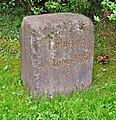Napoléon Eugène Louis Bonaparte
Napoléon Eugène Louis Jean Joseph Bonaparte (born March 16, 1856 in Paris , Palais des Tuileries , † June 1, 1879 in South Africa ) was the Imperial Prince of France ( Prince Imperial and Fils de France ) and the only son of Emperor Napoleon III. and his wife, Empress Eugénie de Montijo .
biography

Prince Louis Napoléon was born during the negotiations for the Peace of Paris , which ended the Crimean War and led to a new constellation of powers in Europe. As the dominant continental power, Russia was then taken over by France under Napoleon III. replaced. The birth was very difficult because the child did not turn in the mother's womb. A forceps delivery was required. With the birth of the prince, the Bonaparte dynasty seemed to have permanent rule in France. The prince was baptized on June 14th in Notre Dame de Paris . His godparents were Joséphine de Beauharnais jr. , Queen of Sweden, and Pope Pius IX. , who was not personally present.
As a child, Napoléon Eugène Bonaparte owned the Saint-Cloud model railway , which was located in a separate area (on the lawn between the Bassin des Trois Bouillons and the Bassin des Chiens ) in the Saint-Cloud Castle park . The illustrations of the model railway date from 1859 and are the oldest surviving models of such a railway.
Prince Louis Napoléon had to go into exile with his parents in England in the 1870s in the wake of the lost Franco-German War and the associated final abolition of the monarchy in France . The imperial family settled in Camden Place, Chislehurst, Kent (now the London Borough of Bromley ). From October 1872, Prince Louis Napoléon attended the Royal Military Academy Woolwich . He was later transferred to the Royal Horse Artillery in Aldershot . After his father died on January 9, 1873, the remaining supporters of the Bonapartes proclaimed Louis as Napoléon IV on March 16, 1874 ineffective as the new "Emperor of the French" and President of the " Bonapartists ". Since the family was often at the English royal court , rumors quickly arose that Louis had married Princess Beatrice , Queen Victoria's youngest daughter - he is said to have made several unsuccessful attempts to hold the hand of a princess.
Louis volunteered as an officer in the British Army in the Zulu War in South Africa . He was to serve on Lord Chelmsford's staff and take up the area over which the British were advancing. The British commanders were repeatedly instructed not to let him get into dangerous situations and to provide him with a sufficiently large escort. On June 1, 1879, he planned to explore the area. But half of his company gathered in the wrong place, so that Louis only left with Lieutenant Carey of the 98th Regiment ( North Staffordshire ) and seven men. They were surprised by 40 Zulu warriors on the iTyotyosi River . The British patrol mounted and most of the men escaped. Louis's horse broke away and he was thrown off. He tried to escape on foot and shoot his pursuers, but was caught up and overwhelmed by them. His body had 18 wounds from Assegais .
In Europe, the death of the last candidate for the French imperial title was viewed with dismay, especially by the supporters of the Bonaparte family. Louis had named Prince Napoléon Victor Bonaparte as his successor and main heir - bypassing his father, Prince Napoléon Joseph Charles Paul Bonaparte (called Plon-Plon ).
Louis' body was shipped to England to be buried next to her father in Chislehurst and later in a mausoleum specially designed by her mother, Saint Michael's Abbey, in her Farnborough estate . His father, Emperor Napoléon III, and, since her death in 1920, his mother are also buried here.
The asteroid (45) Eugenia is named after Eugénie, his mother . When a natural satellite was discovered near Eugenia in 1999, it was named Petit-Prince (“little prince”) after Prince Louis Napoléon .
Prince Louis Napoléon was also called "Lulu". The Lulustein in Saarbrücken reminds of him .
Louis Napoléon shortly after his arrival in Durban
Saint Michael's Abbey Farnborough England
literature
Non-fiction
- Alain Frerejean: Napoléon IV. Un destin 1856-1879 . Michel, Paris 1997, ISBN 2-226-09438-5
- Maurice d'Herisson: The Imperial Prince . Reichel, Leipzig 1894
- Katherine John: Le prince impérial , Julliard, Paris, 1947
- Heinz Rieder: Napoleon III. - Adventurer and Emperor , Casimir Katz Verlag Gernsbach 2006, EDITION KATZ, ISBN 3-938047-16-X
Fiction
- Heinrich Dauthage: Napoleon IV. An unhistorical drama of historical events and people . Zsolnay, Berlin 1938
- Maurice Rostand: Napoléon IV . Edition l'illustration, Paris 1928
Individual evidence
- ^ Heinz Rieder: Napoleon III. Adventure and Emperor p. 217
Web links
- Napoléon Eugène Louis Bonaparte in the Saarland biographies
- St. Michael Abbey website, Farnborough (English / French)
| personal data | |
|---|---|
| SURNAME | Bonaparte, Napoléon Eugène Louis |
| ALTERNATIVE NAMES | Bonaparte, Napoléon Eugène Louis John Joseph |
| BRIEF DESCRIPTION | Prince of France |
| DATE OF BIRTH | March 16, 1856 |
| PLACE OF BIRTH | Paris , Tuileries Palace |
| DATE OF DEATH | June 1, 1879 |
| Place of death | South Africa |







